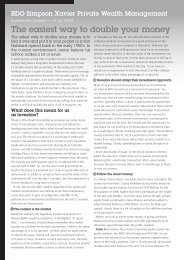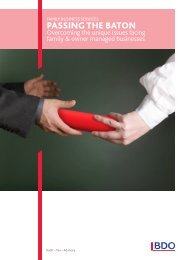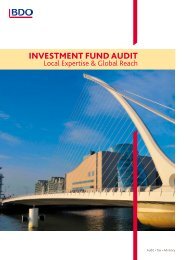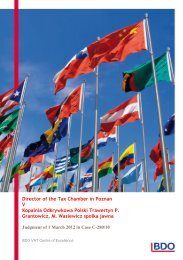SHARE SCHEMES - BDO
SHARE SCHEMES - BDO
SHARE SCHEMES - BDO
You also want an ePaper? Increase the reach of your titles
YUMPU automatically turns print PDFs into web optimized ePapers that Google loves.
tax<br />
<strong>SHARE</strong> <strong>SCHEMES</strong><br />
Revenue approved<br />
and unapproved
Share schemes 1<br />
Introduction<br />
Over the years many companies<br />
based in Ireland have implemented,<br />
and continue to operate, a variety<br />
of different employee share schemes.<br />
However, given the current economic climate, companies<br />
which have not previously considered these schemes<br />
are now looking at the possibilities of using equity<br />
remuneration as a potential cost saving strategy.<br />
There are many advantages to operating share schemes for both<br />
employer and employee – not only do they allow the employee to<br />
participate and share financially in the growth of the company, thereby<br />
retaining and motivating employees, but they can also be a tax efficient<br />
way of rewarding employees.<br />
Based on our experience in working with domestic and foreign corporate<br />
entities in this area we have set out below some of the key reasons<br />
clients look to implement a share scheme:<br />
–– Motivates and incentivises the existing workforce<br />
–– Operates as an effective recruitment and retention tool<br />
–– Provides a tax efficient method of rewarding employees for their<br />
work<br />
–– Employer PRSI savings on all share schemes<br />
–– Encourages unity of thinking between shareholders, management<br />
and employees<br />
–– Employees adopt a shareholder focused approach<br />
–– Assists in succession planning in an owner managed business<br />
–– Can facilitate a management buy-out.<br />
In this booklet we have outlined the key aspects of the following<br />
schemes:<br />
Revenue approved schemes<br />
–– Save As You Earn (SAYE) share option scheme<br />
–– Approved profit sharing scheme.<br />
Unapproved schemes<br />
–– Share option scheme<br />
–– Restricted share scheme<br />
–– Forfeitable share scheme.<br />
<strong>BDO</strong> can assist you with the implementation of these share schemes.<br />
We can offer a comprehensive list of services such as advising on the<br />
appropriate scheme to use, advising on, and reviewing, the relevant<br />
scheme rules and supporting documentation. We can also liaise with<br />
Revenue in relation to getting approval, as necessary, for certain<br />
schemes. Finally, we can provide advice on the filing obligations for the<br />
company and for the participants of the schemes.
2<br />
Share schemes<br />
revenue APPROVED <strong>SCHEMES</strong><br />
Save As You Earn (saye) share option schemes<br />
Key features<br />
––All employees who have been employed for a minimum period of<br />
three years must be entitled to participate in the scheme<br />
––Generally, similar terms must be offered to all relevant employees but<br />
there is scope to offer differing terms to employees by reference to<br />
length of service or salary<br />
––Employees save a fixed sum to a maximum amount of €500 per<br />
month out of their net salary for a pre-determined period (generally<br />
three or five years)<br />
––The employee is granted options based on the level of their agreed<br />
monthly savings<br />
––The SAYE scheme must use a qualified savings contract which enables<br />
the employee to qualify for a tax-free bonus on these savings.<br />
––At the end of the savings period, the employee has the following<br />
choices:<br />
––The share options are exercised and the accumulated savings are<br />
used to fund the share acquisition<br />
––Take the accumulated savings (including interest and bonus<br />
payment) as a tax free lump sum<br />
––Continue to invest the savings with the designated financial<br />
institution.<br />
––The employer can grant options to buy the shares at a price that is up<br />
to 25% less than the market value at grant date<br />
––Revenue approval is required.<br />
Taxation<br />
––The gain realised at exercise (the difference between the value of the<br />
shares and the price paid) is exempt from income tax. However, a<br />
charge to USC and Employee PRSI applies<br />
––The income tax exemption does not apply if options are exercised<br />
within three years of the date of grant. However, there are limited<br />
exceptions<br />
––The exercise of the options is not subject to Employer PRSI.<br />
––A subsequent disposal of the shares will only be subject to Capital<br />
Gains Tax.<br />
Reporting requirements<br />
––Employers are obliged to collect any income tax (if applicable), USC<br />
and Employee PRSI through payroll in the month in which the options<br />
are exercised<br />
––The employer must complete and file a Form SRSO1 with Revenue for<br />
each relevant tax year. The due date for this form is 31st March of the<br />
following year<br />
––Employees will be obliged to return details of the exercise of options,<br />
the option gain and details of any subsequent disposal of the shares<br />
on their annual tax return.<br />
Corporate tax deduction<br />
––The costs a company incurs in establishing a scheme which is<br />
approved by the Revenue Commissioners are allowable as a deduction<br />
in computing the company’s profits for corporation tax<br />
––Where the scheme is not approved within 9 months of the period<br />
end in which the expenditure is incurred then the deduction must be<br />
deferred until the period in which approval is obtained<br />
––However, any payment provided by the company, either directly or<br />
indirectly, to acquire shares for the purposes of an approved scheme is<br />
specifically disallowed.<br />
Example<br />
Employee saves €200 per month for three years and then disposes<br />
of his shares in year five<br />
Market Value of shares €4<br />
Option price (25% discount) €3<br />
Accumulated savings at end of year five €7,500<br />
(including interest and bonus)<br />
Employee purchases 2,250 shares<br />
Market value in year five (per share) €5<br />
Market value of the shares €12,500<br />
Less cost of shares €7,500<br />
Notional pay €5,000<br />
Taxes deductible through payroll<br />
Employee PRSI at 4% €200<br />
Universal Social Charge at 7% €350<br />
Market value in year five (per share) €7<br />
Sales Proceeds €17,500<br />
Less cost of shares €7,500<br />
Chargeable Gain €10,000<br />
Less Annual Exemption €1,270<br />
Taxable Gain €8,730<br />
Capital Gains Tax at 30% €2,619<br />
Overall Net Gain for the Employee €6,831
Share schemes 3<br />
Approved Profit Sharing Schemes<br />
Key features<br />
–– An employee can be allocated up to a maximum of €12,700 worth<br />
of shares tax free in any one year. In certain circumstances this limit<br />
may be increased to €38,100 for year one only where the shares are<br />
appropriated to the APSS from an Employee Share Ownership Trust<br />
(ESOT)<br />
–– Participants are given the right to convert a profit sharing bonus into<br />
shares in their employing company or its parent<br />
–– An element of salary sacrifice towards the purchase of the shares is<br />
allowed. The salary sacrifice is limited to 7.5% of basic salary or the<br />
amount of the employer funded bonus, whichever is lower<br />
–– All employees who have been employed for a minimum period of<br />
three years must be entitled to participate in the scheme<br />
–– Generally, similar terms must be offered to all relevant employees<br />
but scope to offer differing terms to employees by reference to<br />
length of service or salary<br />
–– An employee trust must be established and shares must be held in<br />
trust for a minimum of two years<br />
–– Revenue approval is required.<br />
Taxation<br />
–– No income tax charge arises on appropriation. However, a charge to<br />
USC and Employee PRSI arises<br />
–– Shares may be sold or held personally after two years but income tax<br />
and employee PRSI apply<br />
–– No income tax, USC or employee PRSI on the transfer of ownership<br />
from the trust to the employee at the end of three years<br />
–– No employer PRSI applies under either of the above scenarios<br />
–– The subsequent disposal of the shares will be subject to Capital Gains<br />
Tax.<br />
Reporting requirements<br />
–– The trustees must complete and file a Form ESS1 with Revenue for<br />
each relevant tax year. The due date for filing is 31st March of the<br />
following year<br />
–– Employers are obliged to collect any income tax (if applicable), USC<br />
and Employee PRSI through payroll in the month in which the shares<br />
are appropriated<br />
Employees will be obliged to return details of the acquisition of the<br />
––<br />
shares and details of any subsequent disposal on their annual tax<br />
return.<br />
Corporate tax deduction<br />
–– The costs a company incurs in establishing a scheme which is<br />
approved by the Revenue Commissioners are allowable as a<br />
deduction in computing the company’s profits for corporation tax<br />
–– Where the scheme is not approved within 9 months of the period<br />
end in which the expenditure is incurred then the deduction must be<br />
deferred until the period in which approval is obtained<br />
–– In addition, subject to certain conditions, funds given by the<br />
company to the trustees to acquire shares will also qualify for a<br />
corporate tax deduction.<br />
Example<br />
Employee agrees to invest €7,000 of a profit share bonus in an<br />
Approved Profit Sharing Scheme. Shares in the company to the value<br />
of €7,000 are allocated to the employee but held in a trust entity.<br />
Tax position on appropriation:<br />
Value on date of appropriation €7,000<br />
Taxable amount €7,000<br />
USC (7%), PRSI (4%) €770<br />
If the employee has the shares transferred to them personally within<br />
three years of the share allocation then the employees tax position<br />
will be as follows:<br />
Proceeds €7,000<br />
Taxable amount €7,000<br />
Income Tax (41%), PRSI (4%) €3,150<br />
If the employee has the shares transferred to them personally after<br />
three years of the share allocation then the employees tax position<br />
will be as follows:<br />
Proceeds €7,000<br />
Taxable amount<br />
€NIL<br />
“An employee can be allocated up<br />
to a maximum of €12,700 worth of<br />
shares tax free in any one year.”
4<br />
Share schemes<br />
UNAPPROVED <strong>SCHEMES</strong><br />
Share Option Schemes<br />
Key features<br />
–– More flexible than approved schemes in that there is no obligatory<br />
time restriction imposed on the subsequent sale of the shares and<br />
participation in a share option scheme can be offered on a selective<br />
basis.<br />
Taxation<br />
–– Employees will be subject to income tax, USC and employee PRSI<br />
on the actual exercise of the options irrespective of whether the<br />
employee retains or sells the shares<br />
–– The exercise of the options is not subject to employer PRSI<br />
–– The employee must pay the income tax, USC and PRSI liability within<br />
30 days of the date of exercise of the options. A Form RTSO1 must<br />
be filed with the payment<br />
–– If the shares acquired on exercise are not sold immediately then a<br />
Capital Gains Tax liability may arise on disposal.<br />
Reporting requirements<br />
–– The employer must complete and file a Form RSS1 with Revenue for<br />
each relevant tax year. The due date for filing is 31st March of the<br />
following year<br />
–– Employees will be obliged to return details of the exercise of options,<br />
the option gain and details of any subsequent disposal of the shares<br />
on their annual tax return.<br />
Example<br />
Employee is granted 2,000 share options at €2 per share. The<br />
market value on the date of exercise is €3.50 per share. Employee<br />
decides to dispose of shares after three years for €5 per share.<br />
Gain on exercise of options<br />
Share value €7,000<br />
Option Price €4,000<br />
Gain €3,000<br />
Income Tax (41%), USC (7%), PRSI (4%) €1,560<br />
Net gain €1,440<br />
Employee disposes of shares after three years<br />
Sales proceeds €10,000<br />
Cost €7,000<br />
Chargeable Gain €3,000<br />
Annual Exemption €1,270<br />
Taxable Gain €1,730<br />
CGT @ 30% €519<br />
Overall net proceeds for the<br />
employee, after exercise and sale, is €3,921
Share schemes 5<br />
Restricted Share Schemes<br />
Key features<br />
–– Participation in a restricted share scheme can be offered on a<br />
selective basis<br />
–– Employees will be subject to income tax, USC and employee PRSI on<br />
receipt of the shares. However, the initial liability can be reduced by<br />
imposing restrictions on the shares acquired<br />
–– The level of the reduction is dependent on the length of time the<br />
restrictions are in place. The abatement is 10% for restrictions<br />
imposed for one year and rising incrementally to 60% for restrictions<br />
imposed for more than five years<br />
–– For shares to be treated as restricted shares, the following conditions<br />
must be met:<br />
–– There must be a written contract or agreement in place under<br />
the terms of which there is a restriction on the freedom of the<br />
director or employee by whom the shares are held to assign,<br />
charge, pledge as security for a loan or other debt, transfer, or<br />
otherwise dispose of the shares for a set period<br />
–– The agreement must be in place for bone fide commercial<br />
purposes<br />
–– Shares can only be assigned, charged, pledged, transferred or<br />
disposed of during the restricted period on the death of the<br />
shareholder or certain takeover situations<br />
–– Share must be held in a trust established by the employer for the<br />
benefit of the employees or held under such other arrangements<br />
as the Revenue may allow.<br />
–– If restrictions are varied after the share issue or a specific event<br />
arises (death of the shareholder or certain takeover situations) then<br />
the charge to income tax is adjusted to take account of the actual<br />
restriction.<br />
Taxation<br />
–– The receipt of the restricted shares will not be subject to employer<br />
PRSI<br />
–– If the shares are issued to the employee for no consideration then<br />
income tax, USC and employee PRSI will apply on the restricted<br />
valuation<br />
–– The employer is obliged to withhold the income tax, USC and<br />
employee PRSI through payroll<br />
–– A subsequent disposal of the shares after the restriction period has<br />
lapsed will only be subject to Capital Gains Tax.<br />
Reporting requirements<br />
–– The employer must complete and file a Form RSS1 with Revenue for<br />
each relevant tax year. The due date for filing is 31st March of the<br />
following year<br />
–– Employees will be obliged to return details of the receipt of the<br />
restricted shares on their annual tax return together with details of any<br />
subsequent disposal of the shares.<br />
Corporate tax deduction<br />
–– The set up and administration costs of the scheme are allowed for<br />
corporate tax purposes<br />
–– The cost of a share purchase for the purposes of this scheme is also<br />
allowable for corporate tax purposes.<br />
Example<br />
Employee is granted shares with a market value of €10,000 but with a five year and one month restriction imposed on the sale of the shares.<br />
Income tax on subscription<br />
Market Value €10,000<br />
Price paid by employee<br />
NIL<br />
Gain €10,000<br />
Abatement (60%) (€6,000)<br />
Net Gain €4,000<br />
Income Tax (41%), USC (7%), PRSI (4%) €2,080<br />
Employee disposes of shares<br />
Sales proceeds €15,000<br />
Cost €4,000<br />
Chargeable Gain €11,000<br />
Less Annual Exemption €1,270<br />
Taxable Gain €9,730<br />
CGT @ 30% €2,919<br />
Overall net proceeds for the employee is €10,001<br />
Employees will be subject to income tax,<br />
USC and employee PRSI on receipt of the<br />
shares. However, the initial liability can be<br />
reduced by imposing restrictions on the<br />
shares acquired
6<br />
Share schemes<br />
Companies which have not previously<br />
considered these share schemes are<br />
now looking at the possibilities of using<br />
equity remuneration as a potential cost<br />
saving strategy<br />
IDA Ireland (Industrial Development Agency)<br />
FORFEITABLE <strong>SHARE</strong> SCHEME<br />
Key Criteria<br />
Where shares are subject to a risk of forfeiture, any tax imposed on<br />
acquisition will be reduced.<br />
To qualify for this treatment, the shares must be:<br />
–– shares in the company in which the employee/director is employed or<br />
in a company that controls that company, and<br />
–– forfeitable shares.<br />
Shares are forfeitable shares if there is a bona fide written agreement in<br />
place under the terms of which:<br />
–– there will be a forfeiture of the shares if certain circumstances arise or do<br />
not arise (e.g. if an employee ceases to be employed by a certain date)<br />
–– as a result of the forfeiture the employee/director will cease to have<br />
any beneficial interest in the shares, and<br />
–– the employee/director, on forfeiture, will not have any entitlement<br />
to receive consideration for the shares in excess of the consideration<br />
given by the employee/director to acquire the shares.<br />
Taxation<br />
–– Income Tax, Employee PRSI and Universal Social Charge is payable on<br />
the discount received on acquisition<br />
–– Employers’ PRSI is not applicable<br />
–– Where forfeiture occurs, the taxes imposed on acquisition are reduced<br />
–– Any loss arising on the forfeiture of shares is restricted to the amount<br />
of consideration given by the employee/director for the shares less<br />
any amount subsequently recovered on forfeiture.<br />
Reporting requirements<br />
–– The employer must complete and file a Form RSS1 with Revenue for<br />
each relevant tax year. The due date for filing is 31st March of the<br />
following year<br />
–– Employees will be obliged to return details of the receipt of the<br />
forfeited shares on their annual tax return together with details of any<br />
subsequent disposal of the shares.<br />
Example 1<br />
On 1 January 2012, an employer awards 2,000 shares to an employee<br />
for €1,200. Under a bona-fide written contract, the shares are<br />
subject to forfeiture if the employee ceases with the employer<br />
before 1 June 2013. The market value of the shares at the date of<br />
the award is €2,000. The employee ceases with the company on 1<br />
September 2012 and the shares are forfeited. The employer refunds<br />
the employee the €1,200 paid for the shares.<br />
Tax Payable on Acquisition<br />
Market Value €2,000<br />
Consideration Paid €1,200<br />
Amount Chargeable as Notional Pay €800<br />
Tax (41%), PRSI (4%), USC (7%) €416<br />
Forfeiture of Shares<br />
Revised Tax Charge<br />
Tax Refundable €416<br />
No gain/loss arises on the disposal.<br />
Example 2<br />
As above, but the employee remains with the company and disposes<br />
the shares on 1 February 2015 for €10,000.<br />
Tax Payable on Acquisition<br />
Disposal of Shares<br />
Nil<br />
€416 (as noted above)<br />
Proceeds €10,000<br />
Less Cost €2,000<br />
Chargeable Gain €8,000<br />
Less Annual Exemption €1,270<br />
Taxable Gain €6,730<br />
CGT at 30% €2,019<br />
Corporate tax deduction<br />
–– The set up and administration costs of the scheme are allowed for<br />
corporate tax purposes<br />
–– The cost of a share purchase for the purposes of this scheme is also<br />
allowable for corporate tax purposes.
Share schemes 7<br />
contacts<br />
CiarÁn Medlar<br />
Partner,<br />
cmedlar@bdo.ie<br />
+353 1 470 0280<br />
Mark Hynes<br />
Director,<br />
mhynes@bdo.ie<br />
+353 1 470 0283<br />
Richard Marshall<br />
Assistant Manager,<br />
rmarshall@bdo.ie<br />
+353 1 470 0285<br />
NOTES
For further information<br />
please contact:<br />
CiarÁn Medlar, Partner,<br />
at cmedlar@bdo.ie or<br />
+353 1 470 0280<br />
Mark Hynes, Director,<br />
at mhynes@bdo.ie or<br />
+353 1 470 0283<br />
Richard Marshall, Assistant Manager,<br />
at rmarshall@bdo.ie or<br />
+353 1 470 0285<br />
This publication has been carefully prepared, but it has been written<br />
in general terms and should be seen as broad guidance only. The<br />
publication cannot be relied upon to cover specific situations and<br />
you should not act, or refrain from acting, upon the information<br />
contained therein without obtaining specific professional advice. Please<br />
contact <strong>BDO</strong> to discuss these matters in the context of your particular<br />
circumstances. <strong>BDO</strong>, its partners, employees and agents do not accept<br />
or assume any liability or duty of care for any loss arising from any<br />
action taken or not taken by anyone in reliance on the information in<br />
this publication or for any decision based on it.<br />
<strong>BDO</strong> is authorised by the Institute of Chartered Accountants in Ireland<br />
to carry on investment business.<br />
<strong>BDO</strong>, a partnership established under Irish Law, is a member of <strong>BDO</strong><br />
International Limited, a UK company limited by guarantee, and forms<br />
part of the international <strong>BDO</strong> network of independent members firms.<br />
<strong>BDO</strong> is the brand name for the <strong>BDO</strong> International network and for each<br />
of the <strong>BDO</strong> Member Firms.<br />
www.bdo.ie<br />
© <strong>BDO</strong> 2012<br />
v1.1.20130110



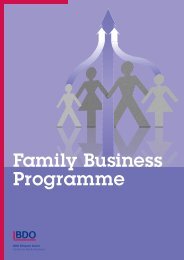
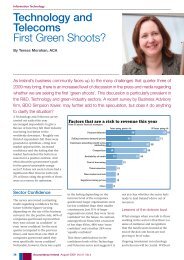



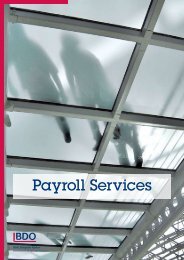

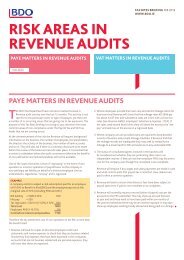
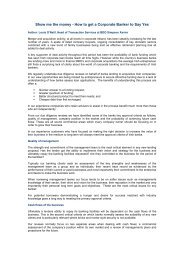
![eii 2013 a5 2pp flyer [web].pdf - BDO](https://img.yumpu.com/39595753/1/184x260/eii-2013-a5-2pp-flyer-webpdf-bdo.jpg?quality=85)
